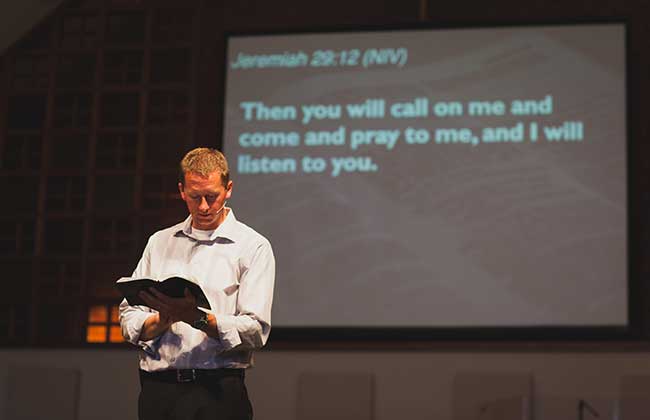When Ryan Bajema started working as director of youth ministries at First Reformed Church in Lynden, Washington, he never imagined he’d one day become the senior pastor.
With his congregation’s encouragement, a hometown boy unexpectedly grows into pastoral ministry
Ryan Bajema’s story is one of homegrown leadership—of the local boy becoming a pastor, unexpectedly, in the small town where he grew up. It’s Bajema’s story, but it’s also the story of the church that got him there.
Bajema has been senior pastor of First Reformed Church in Lynden, Washington, since 2009. But when he started working there as director of youth ministries in 2002, pastoring wasn’t part of his plan.
“I always loved this community I grew up in, but I never envisioned being a pastor here,” says Bajema, who grew up in the Christian Reformed Church across the street from First.
Soon after he was hired, the First Reformed congregation saw in Bajema what he did not yet see in himself: the capacity for leading a church. He began working part-time toward his M.Div., and met weekly with a pastoral mentor. In 2005, while still in school, he transitioned into the role of pastor of congregational life—a move that meant more preaching and staff leadership. And then, just three years later, First Reformed called him to step into the role of lead pastor.
Bajema gives all the credit for his growth to God—and to his congregation.
“Both transitions felt like it was God moving me into a new leadership capacity, more than myself desiring a new position,” he says. “Even with six and a half years under my belt at First, I wasn’t sure I was ready to serve as their lead pastor. But when I stepped into [the job], I felt total affirmation [from the congregation], because in many ways, I had grown up with them. They had learned to trust me, and I had learned to trust them.”
The road to lead pastor was a learning process, he says. First Reformed challenged him to expand his leadership skills by working with ministries that naturally aligned with his strengths, such as preaching and small-group ministry. Over the years, he felt encouragement from the congregation and spiritual support from church leaders. They left him ample time to meet with his mentor and make his family a priority. And the church, valuing a team approach, always paired Bajema with another individual or team when he stepped into new ventures.
“The leadership at First was intentional to always surround me with mature, spiritually healthy, and experienced leaders who would walk with me in community as I grew,” he says. “Reflecting back, this was one of their greatest contributions to me: never to leave me on my own, but always ensure someone was in the trenches of ministry with me.”
Bajema’s experience at First Reformed has been one of personal transformation, of course, but it’s also had an effect on the entire church. Since becoming lead pastor, Bajema has helped hire several staff members, and he finds that the church looks within itself for leaders more often than it used to.
“I think my journey at FRC has influenced our approach to leadership,” he says. “If possible, we try and raise up leaders from within the church. Finding individuals who know, understand, and are a part of our unique church culture is invaluable.
“My sense is that churches would be wise to think intentionally about putting in place processes of leadership development and begin identifying future leaders and investing into them. My story has taught me that the local church is fertile soil for transformational leadership development…It’s been a great story that God continues to write, and I’m excited to see how it continues to unfold.”





